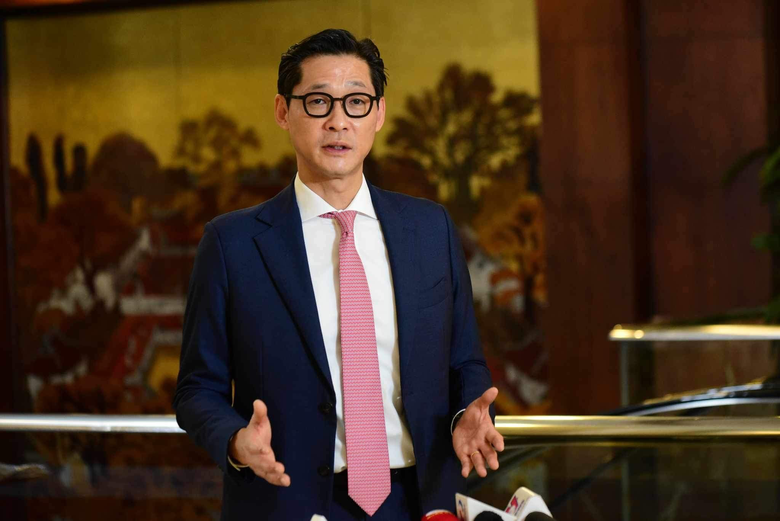
Joon Suk Park, Head of International Subsidiary Banking, Wholesale Banking, HSBC Vietnam
With our 150-year history, HSBC can capitalise on HSBC’s global presence to support foreign direct investment (FDI). HSBC can help FDI companies and multinational corporations take advantage of the incentives provided by the Vietnamese government and free-trade agreements. In addition to direct investors, there are also indirect investors and foreign funds that are interested in Vietnam.
As Vietnam's economy continues to emerge, investors are interested in fast-growing industries such as e-commerce, healthcare, education, and renewable energy. They are also paying attention to sustainable supply chains, taking into consideration macroeconomic contexts. They are also interested in the research and development capability of Vietnam. Other important factors for direct and indirect investors alike are the transparency of governance and the monitoring environment.
 |
Truong An Duong, General Manager, North Vietnam & Residential, Frasers Property Vietnam
Vietnam has spent 30 years developing industrial zones (IZs). The number and total area of IZs has increased rapidly over the past three decades, contributing to Vietnam's economic growth.
20 years ago, IZs mainly served labour-intensive industries. However, over the past decade, they have lured more investors in the high-tech and electronics sectors, which use less labour. In line with the global trend, the IZ operators are now shifting focus to attracting these high-tech investors and the necessary skilled workers.
There has been a growing demand for warehouses and ready-built factories due to the expansion of global giants like Samsung, LG, and their suppliers. It is predicted this demand will continue to grow in Vietnam, given the wave of relocations involving major manufacturers. Meanwhile, the e-commerce boom has also created strong demand for warehouse and logistics. Furthermore, requirements for sustainable factories will increase in the medium to long term. These are the key drivers for the industrial real estate segment.
Kim Le Huy, Vice-President, Business Unit Consumer Goods, DKSH Vietnam
DKSH Vietnam is the leading market expansion services provider for companies that want to grow their business in Vietnam. DKSH has tailored solutions and methods to help companies do business here. The company has invested in more than 21 state-of-the-art operation centres throughout the country, including distribution systems and trans-shipment systems. The company has also invested in cutting-edge laboratories. Our key focus areas are building strong human resources, ensuring compliance with policies, and responding to government agencies.
DKSH Vietnam is also a reliable partner for many businesses thanks to our strong supply chain. During the COVID-19 pandemic, DKSH Vietnam has made it our top priority to take care of employees. DKSH Vietnam also develops leadership personnel who have an understanding of the market and can find suitable solutions. Moreover, DKSH Vietnam pays attention to improving operating systems to stay resilient.
Investment companies share Vietnamese success stories
Steven Wolstenholme, President and CEO, South Hoi An Development Ltd. - Hoiana Resort & Golf
Vietnam has beautiful nature with a coastline stretching over 3000 km, many beautiful pristine islands, and tropical climates that can be exploited for tourism all year round. The country's rich, diverse culture and friendly, hospitable people are also a valuable resource.
However, tourism still has a lot of room for development here. It is important to promote local tourism to foreign investors while also preserving it, to create a sustainable ecosystem with a variety of products and services.
In 2019, Vietnam was among the top 10 countries with the fastest growing tourism sectors, with revenue reaching around $32.2 million (VND755 billion), accounting for nearly 10 per cent of the country's GDP. Vietnam could potentially hit much larger figures than that in the future.
Khuat Quang Huy, Director of Corporate Affairs at Nestlé Vietnam
Nestlé Vietnam has invested $750 million (VND17.6 trillion) in Vietnam by building 4 factories. In the third quarter of 2021, the company announced its commitment to expand investment here. Specifically, the company is spending an additional $132 million (VND3 trillion) on expanding the capacity of Nestlé's largest coffee factory in Vietnam.
Nestlé Vietnam has a talent training scheme to create opportunities for interns, and the company is sending middle managers to Nestlé overseas to learn and return to work in Vietnam.
In addition, Nestlé globally purchases 20-25% of Vietnam's coffee output to process worldwide into coffee products. The company also works closely with farmers through its NESCAFÉ Plan, which aims to transfer knowledge of sustainable coffee farming to farmers. About 260,000 farmers have benefited from the NESCAFÉ Plan over the past 12 years.


























